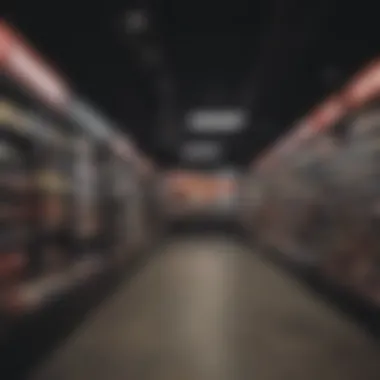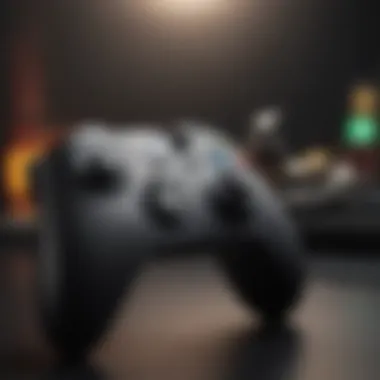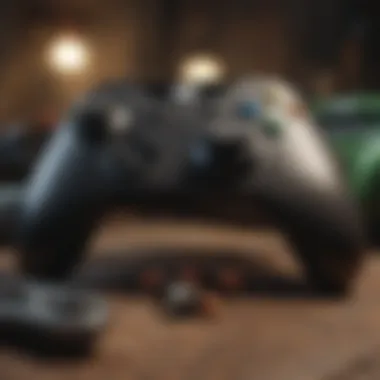Exploring the Trade Dynamics of Xbox One Controllers


Intro
In the fast-paced world of gaming, consumer habits continuously shift, making the buying and trading of gaming accessories a fascinating topic. As gamers evaluate their gear, the dynamics of trading Xbox One controllers at GameStop stands as a compelling case study. The ebb and flow of controller exchanges not only impacts gamers' wallets but also touches on the wider implications of sustainability and consumer trends.
Understanding this arena involves not just a look at the monetary values assigned to these controllers but also an examination of the processes behind trade-ins, the emotional and strategic choices consumers make, and how these transactions contribute to a larger narrative in the gaming community.
Games News
Latest Updates
As of late 2023, GameStop has been making headlines with its evolving trade-in policies, particularly focused on consoles and accessories. Recent promotions have caught the eye of many gamers, featuring increased valuations for certain controllers. This has stirred up discussions in online forums, with gamers exchanging tips on how to maximize their trade-in values while also updating their gear.
Breaking Stories
One notable incident involved GameStop's announcement of a new partnership with major gaming brands to provide exclusive trade-in bonuses for premium Xbox One controllers. This decision not only draws customers into the stores but also creates a buzz in gaming circles, with discussions on Reddit about its impact on controller resale value.
Trending Topics
The trend of trading gaming accessories, especially controllers, reflects a broader conversation about environmental responsibility in gaming. As gamers become more conscious about sustainability, the conversation around refurbishing and reusing controllers has gained traction. This is evident in online communities where users share their experiences and strategies, focusing on how trading in old controllers can benefit both their wallets and the planet.
The Dynamics of Controller Trade-Ins
While news updates provide a snapshot of the current landscape, understanding the intricacies of the trade-in process at GameStop requires delving deeper. Factors such as controller condition, frequency of updates from manufacturers, and the popularity of different models all play a significant role in determining trade-in values.
Various consumers approach these trades differently. Some strategize around the timing of their trades to coincide with announcements of new games or consoles, which often cause fluctuations in accessory values. It’s not unusual for a collector to hold on to a controller for years only to trade it in at just the right moment, cashing in before a newer model drops.
The combination of current market demands and predictive consumer behavior culminates in a fascinating exchange where values can vary dramatically within short time frames. Each transaction tells a story of its own, intertwined with the gamer’s personal journey through the evolving landscape of gaming hardware and experiences.
Finale
Overview of GameStop's Trade-in Model
The trade-in model at GameStop stands as a beacon for gamers looking to refresh their gear without breaking the bank. This model isn’t just about saving a few bucks; it's a way of engaging in the steady cycle of gaming consumption that keeps many players in the loop with the latest technology. By allowing individuals to exchange old Xbox One controllers for credit, GameStop underscores a pivotal shift in how gamers manage their inventories. This exchange fosters not only an economic benefit but also cultivates a sense of community among gamers, binding them to a larger ecosystem of shared experiences.
One of the main reasons this model remains popular is the convenience it offers. Rather than letting outdated equipment gather dust in the closet, players can trade them in for something more relevant, ensuring that their gaming setup is always up to snuff. Moreover, the trade-in process appeals to environmentally-conscious players, reducing e-waste and promoting a more sustainable approach to gaming.
How the Trade-in Process Works
To engage with GameStop's trade-in process, a customer merely needs to bring their Xbox One controller to a local store. Upon arrival, the process is straightforward: GameStop staff evaluate the controller's condition, checking for signs of wear and ensuring that all major functions are working properly. Factors like missing buttons, stick drift, or cosmetic damage can heavily influence the final appraisal.
After assessing the controller, the employee will provide a trade-in value, which the customer can either accept or decline. If accepted, the customer can use that credit immediately towards a new purchase or save it for a later date. What's interesting here is the fluidity of value determined by fluctuating market preferences – sometimes, a controller in good working order might fetch a surprising amount if it's a sought-after model.
Estimated Trade-in Values for Xbox One Controllers
When discussing trade-in values, every model tells its own story. Trade-in values can vary significantly from gamepad to gamepad. Generally, Xbox One controllers, especially limited editions or those in prime condition, can fetch between $20 to $50. Here are some examples:
- Standard Controllers: Typically valued around $20-$30, depending on condition.
- Elite Controllers: These can be valued much higher, potentially reaching $50 or more, given their advanced features and demand.
- Limited Editions: Values can fluctuate widely based on market interest; some collectors may be willing to trade premium prices, depending on their rarity at the time of trade.


"The trade-in process at GameStop offers a unique opportunity for gamers to stay connected with evolving technology while also taking part in a sustainable gaming environment."
By trading in Xbox One controllers, users can meaningfully contribute to this ecosystem and ensure that their experience evolves alongside the gaming landscape.
Factors Influencing Trade-in Value
When discussing the trade-in of Xbox One controllers at GameStop, understanding the factors influencing trade-in values is crucial. It's not just about swapping old gear for new; it's about recognizing how various elements intertwine to determine the amount you'll get back in your pocket. In the gaming realm where technology evolves rapidly, knowing these factors makes all the difference.
Controller Condition and Features
The physical state of a controller plays a monumental role in its trade-in value. A controller that appears pristine, with no scratches, sticky buttons, or faded artwork, is likely to fetch a better price. Features also come into play. Take, for instance, special editions or controllers with unique functionalities, like customizable button mapping. These characteristics can increase desirability and subsequently, the trade-in value.
It's wise to check for the following before heading to GameStop:
- Overall physical condition: Look for any noticeable wear and tear.
- Included accessories: Does it come with its original packaging or extra parts, like charging cables? This could sweeten the deal.
- Limited Editions: A sleek, special edition controller can really turn heads and lift your trade-in offer.
Before making a deal, consider cleaning up your controller, as a little shine can go a long way in boosting its appearance!
Market Trends and Demand
Market fluctuations can be as unpredictable as the weather. The gaming community's appetite for certain types of controllers can drastically shift based on trends. Seasonal releases, game updates, or even popular streamers showcasing a particular model can spark interest.
For example, during the launch of highly anticipated games or new gaming consoles, related accessories tend to see increased demand. This uptick can bolster your trade-in value quite a bit. To stay in the know:
- Follow gaming news: Websites like reddit.com often discuss trends and what gamers are currently buzzing about.
- Observe surrounding content: Watching gameplay videos or live streams can give insights into what gear is sought after.
Understanding these trends can help you strategize when to trade in your old controllers for the best bang for your buck.
Seasonal Effects on Pricing
Timing your trade-in can often mean the difference between a decent offer and a fantastic one. Just like that dreaded winter snowstorm or a sunny summer day, trading in your Xbox One controller can be influenced by the season. Holiday seasons often see a spike in trade-ins as gamers flock to purchase new accessories for their consoles.
In contrast, during quieter months, many may find that prices drop. Some gamers may also choose to hold on to their old controllers until a specific game release that could incite a price increase. Here are a few pertinent points:
- Black Friday and holiday sales: These periods may amplify trade-in offers.
- Back-to-school season: This time may also trigger an uptick in gaming purchases and trade-ins.
- New console or game releases: Keep an ear to the ground for upcoming launches that could raise interest in trading in old gear.
In summary, being aware of seasonal dynamics can help maximize the value of your trade-ins, allowing you to navigate the market like a pro.
"The best time to trade in is when everyone else is busy shopping or selling, as demand peaks the price often does too."
By grasping these various influences on trade-in value, gamers can make informed decisions at GameStop, ensuring they're getting a fair deal in this ever-evolving landscape.
Alternative Trade-in Options
When contemplating the trade-in of Xbox One controllers, it's worth considering alternative avenues beyond the familiar GameStop option. Exploring these alternatives not only offers gamers a broader understanding of their choices but can also lead to more favorable trade-in values. Knowing where and how to trade in controllers is crucial in making informed decisions.
Comparison with Online Retailers


The rise of online platforms has changed how gamers can get rid of their old controllers. Unlike the localized approach of GameStop, online retailers such as eBay, Amazon, and Craigslist have opened avenues for broader reach. The global market means prices can vary wildly. For instance, collectors may pay a premium for rare versions of Xbox One controllers. While it may take longer to find a buyer, the potential for greater profit is significant.
- Wider Audience: Online listings can be seen by many buyers, increasing chances of quick sales.
- Seller Control: Gamers can set their own prices and accept offers, allowing flexibility.
- Niche Markets: Specialized retro gaming sites may pay top dollar for vintage controllers.
However, dealing with buyers online comes with its own set of challenges. Shipping costs can cut into profits, and ensuring secure transactions can require extra vigilance. For many, the ease of a local trade is still quite attractive.
Local Game Shops and Community Marketplaces
Exploring local game shops and community marketplaces offers another avenue for trading. These environments usually have a more personalized touch compared to bigger chains.
- In-Person Transactions: Buyers have the opportunity to inspect the controller first-hand, which can often lead to a more favorable deal.
- Building Relationships: Developing a rapport with local shop owners might yield better offers in the future, as they get to know your preferences and items.
- Support Small Businesses: Many gaming enthusiasts prefer supporting local shops over larger chains. These stores often foster community ties that larger retailers may overlook.
While the trade-in values might not always stack up against alternatives like online marketplaces, the sense of community and immediate feedback could reassure many gamers about their decisions.
The Role of Social Media in Trading
Social media has increasingly become a player in the resale market for gaming equipment, including Xbox One controllers. Platforms like Facebook Marketplace and Reddit have niche groups where users can buy, sell, or trade their gaming gear.
- Immediate Listing: Posting a controller for trade can be as easy as snapping a picture and typing a description.
- Local Networks: Many platforms allow for localized sales, cutting shipping costs and time.
- Interactions and Feedback: Most platforms feature user ratings and reviews, which can assure both buyers and sellers of their credibility.
Using social media not only reaches a varied audience but also allows sellers to engage with their community, often leading to fairer negotiations. Compared to trading at a retail location, this approach empowers users with more control over their trade experience.
"Trade-ins are not just about exchanging items; they are also about community engagement and building relationships in the gaming world."
In every exploration of trade-in options, the key consideration remains the balance between value and convenience. It's important for gamers to evaluate what aspects matter most to them—be it immediate cash, nostalgia for old gear, or the thrill of a potential profit.
Environmental and Economic Implications
In any conversation regarding trading Xbox One controllers, it’s crucial to highlight the environmental and economic implications that ripple through the gaming community. The trade-in system isn’t just about saving a few bucks or acquiring new gear; it encapsulates a broader narrative about sustainability and our consumer practices. When we look at the ecology of gaming accessories, especially controllers, we start to untangle the real costs associated with our habits—both financial and environmental.
Sustainability in Gaming
Sustainability is a term that has gained traction across various industries, but in gaming, it often remains an afterthought. However, it shouldn't be. With the rapid evolution of technology, the e-waste generated by old or discarded controllers is staggering. Every plastic piece and electronic component carries a weight of responsibility. By participating in GameStop's trade-in program, gamers have a chance to close the loop on their purchases. Instead of letting old controllers languish in landfills, players can recycle and reuse, helping to divert significant quantities of material from becoming waste. This practice not only promotes a cleaner environment but also fosters a culture of responsibility among consumers.
“Every controller traded in is a step towards a more sustainable gaming future.”
When the gaming community starts to think in terms of sustainability, it can influence manufacturers to adopt more eco-friendly practices. As game enthusiasts, a grassroots movement emerges, encouraging big names in the industry, like Microsoft, to innovate in ways that minimize their environmental footprint.
Consumer Behavior and Consumption Patterns
The way consumers approach gaming reflects broader societal trends. Many gamers think of trading in their controllers as simply an act of saving cash but, in many ways, it mirrors their impulse buys and subsequent remorse. The act of trading in drives a cycle where consumers are more thoughtful about their purchases. They tend to consider the longevity of an accessory before shelling out cash, which, in turn, influences how products are designed and marketed by companies.
Moreover, understanding consumption patterns can inform what types of accessories are popular at any moment. One can argue that this behavior spurs a healthy dialogue about necessity versus want. Just like fleeting fashion trends, what’s hot today may be old news next month. By facilitating a space for consumers to exchange their products, GameStop contributes to a reflective culture regarding gaming accessories—one that weighs value more heavily than just the immediacy of new purchases.
Impact of Controller Disposal on the Environment
Disposing of gaming controllers isn’t often on the radar, though it deserves our attention. Most gamers might not realize that improper disposal can contribute significantly to environmental degradation. Plastic materials and electronic components can take hundreds of years to decompose, leaching toxic substances into the soil and water during that time. By participating in the trade-in process, gamers significantly mitigate these hazards.


Here are a few insights on controller disposal:
- E-Waste Concerns: Old controllers often end up in landfills, where they become part of a much larger e-waste issue, which is one of the fastest-growing waste streams globally.
- Toxins in Electronics: Controllers contain materials that can be harmful to the environment; for instance, lead and mercury can be found in older models. Proper trade-in can help address this issue.
- Recycling Benefits: Many trade-in programs partner with recycling companies. This ensures that as much material as possible is reclaimed and reused in manufacturing new products.
By raising the awareness of controller disposal and its environmental impact, the gaming community can help herald a new age of responsibility—one where gamers exercise mindful consumption practices, helping to create a healthier planet for future generations.
The Future of Gaming Accessories Trade-ins
The landscape of gaming accessories is shifting, and understanding the future of trade-ins is paramount for both gamers and retailers. As technology continues to evolve, the way we interact with gaming devices, including controllers like the Xbox One, is in flux. This section navigates the complexities of what the future holds for trade-ins at GameStop and similar retailers, illuminating potential developments that could redefine consumer experiences.
Trends Shaping the Gaming Market
The gaming market is constantly reshaped by various trends that are as dynamic as the games themselves. One notable trend is the rise of digital gaming. With more gamers opting for downloadable content over physical copies, the demand for physical accessories, including controllers, might see fluctuations. Additionally, the emergence of virtual reality gaming requires specialized equipment and might impact traditional trade-in practices. Gamers could soon find that their Xbox One controllers are no longer compatible with newer gaming systems or experiences, thereby necessitating a shift in focus towards investing in more versatile or advanced controllers.
Moreover, the increasing focus on sustainability within the gaming community cannot be overlooked. Gamers are becoming more conscious about the environmental impacts of their purchases. Retailers may need to adapt trade-in programs that prioritize eco-friendly practices. For instance, promoting controller recycling as part of the trade-in procedure could resonate well with a mindful audience.
Potential Innovations in Trade-in Programs
As we peer into the crystal ball of gaming accessories, several innovations in trade-in programs surface. One possibility is the introduction of digital trade-in platforms. Imagine a hassle-free app that allows gamers to seamlessly trade in their controllers for instant credit towards new purchases. This could streamline the process and enhance customer engagement, especially for those who appreciate convenience.
Another innovation might involve loyalty rewards programs that provide additional incentives for trading in older controllers. This strategy not only benefits consumers but can also foster a sense of community among gamers. After all, a loyal customer base can be a retailer's golden ticket to sustained success.
"Innovation is the key to staying relevant in an ever-evolving gaming world. Retailers must adapt and cater to the changing demands of consumers to thrive."
Additionally, digital incentives—such as exclusive content or in-game rewards—could be tied to trade-in activities. This could motivate players to think twice before tossing their old gear aside, creating a culture where trading in accessories is not just a transaction but a means to enhance their gaming experience as a whole.
In summary, by keeping an eye on the trends shaping the gaming industry and embracing potential innovations, retailers like GameStop can pave the way for a more sustainable and efficient future in trading gaming accessories. Adaptability will be crucial as the market evolves, and understanding these dynamics will benefit both consumers and retailers alike.
The End and Final Thoughts
Trading Xbox One controllers at GameStop encapsulates various financial, environmental, and strategic implications that resonate deeply within the gaming community. This trade-in mechanism is not simply a transaction; it reflects changing consumer preferences and the evolving gaming ecosystem. As gamers continue to upgrade their gear, being informed about the nuances of trade-in processes becomes vital.
Key elements to take away include the impacts of controller condition, current market trends, and the seasonal variations that could affect trade-in values. Recognizing these considerations can empower gamers to make the most of their trade-in experiences, ensuring they maximize the returns on their used controllers. Moreover, it's worth considering broader market contexts and consumption patterns, which can shape future trends in gaming accessories.
One cannot overlook the environmental ramifications of controller disposal. In a world increasingly cognizant of sustainability, understanding how trade-in programs like those at GameStop affect the overall lifecycle of gaming products can give players a sense of responsibility and involvement in planetary health.
“The commodification of gaming accessories is more than just economics; it speaks to our values as consumers and as members of the planet.”
In summary, the dynamics of trading Xbox One controllers at GameStop highlight a complex web of influences - from personal financial benefit and environmental consciousness to the very fabric of gaming culture itself. Engaging in these practices not only helps individuals but also contributes to a larger communal narrative that values sustainability and smart consumption.
Summarizing Key Insights
The essence of trading at GameStop hinges on several aspects:
- Transparency in Process: Understanding the nitty-gritty of the trade-in model helps users navigate through their options effectively.
- Value Determinants: Knowledge of what drives controller value can significantly influence trade decisions. For instance, a well-preserved controller with original packaging will often yield higher returns.
- Market Fluctuations: Keeping an eye on current market conditions can guide when to trade in; savvy gamers might hold onto their controllers during a low-value season before swapping when values rise.
- Environmental Awareness: Awareness of the potential waste generated by discarded controllers encourages more gamers to partake in responsible trading practices rather than simply tossing their old equipment.
Looking Ahead in the Gaming Landscape
The future of gaming and accessories trade-ins seems poised for evolution. Several trends are emerging:
- Growing Emphasis on Sustainability: As environmental concerns rise, we’re likely to see GameStop and similar entities refining their trade-in policies to emphasize recyclable and sustainable practices.
- Technological Advances: With the arrival of new technologies, such as advanced experience vehicles like virtual reality systems, gaming controllers will continue to evolve. This begs the question of how trade-in values will adjust in response.
- Community Engagement: Platforms and social channels that facilitate direct connections between buyers and sellers might reshape how trade-in values are established, potentially bypassing traditional retailer models.
Ultimately, as we glance ahead in this ever-changing landscape, it’s crucial for gamers and industry stakeholders to remain adaptable. The way we accept, trade, and value gaming controllers will likely shift, influenced by economic factors, consumer habits, and a growing recognition of our collective responsibilities towards sustainable practices.



